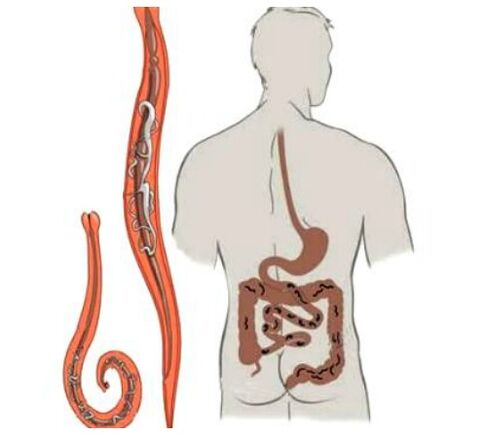The human body is an ideal environment for the habitat of pathogenic micro -organisms that could affect almost any organ or system, creating some diseases and disorders. These organisms include a special place for parasites that live and feed on other cells and nutrients of the "owner". According to medical indicators, about 90% of the population of various age categories are parasites carriers, and the treatment and study are engaged in the part of the medicine - parasitology. The term "parasites" means living organisms of different types of ability, which decides in the human body, to bring in the tissues of internal organs, eating cells, juices or digestive foods. Foreign organisms can enter any part of our body and live there for a long time or throughout a person's life. There are no special changes to some types of parasites in the human body, but those who have a negative impact on the "host", causing the development of some serious diseases. In such cases, we are talking about parasitic diseases that require immediate treatment. In medicine, parasites are given any pathogenic organism that leads to a parasitic lifestyle in the human body. These include a variety of bacteria, viruses, fungi, as well as worms, simple, non -resident, airtropod, protozoal invasion and other species.
What are parasitic diseases?
 >
>Parasitic diseases (invasion) are a large group of diseases that create a pathogenic variety that lives and increases within a person. There are about 300 types of parasites that could influence human body. Parasitic diseases can lead to parasitic bacteria and protozoa parasitic, parasites or other viruses. The list of parasites in the human body is very large, but regardless of the type, almost all of them emit toxins that destroy cellular structures, which damage the internal organs, which goes into the lymph flow, the blood, which poison the body and affects the work of internal organs and systems.
Essentially, pathogenic organisms eat nutrients that a person gets together with food. This behavior of "uninvited guests" may explain that many people do not lead the right lifestyle, monitor their health and their food, the desired result, since these "dormers" take the best away, which means that a person has only a small particle of useful substances. These creatures are so unhappy that they are often hidden as other diseases, and one can walk around doctors for years, but do not notice a positive result in treatment.
How does parasites fall into the human body?
Foreign organisms can enter the human body in different ways, but the infection often occurs by:
- Water or soil infected with worms.
- Food products are not after the desired processing: meat, fish, dirty vegetables, fruits, dairy products.
- Contact with home or homeless animals.
- Insect bite.
- Non -compliance with personal hygiene rules.
- Close contact with the parasites carrier.
Many parasites living in the human body do not have a nervous, cardiovascular or respiratory system, but their reproductive organs can wear hundreds of thousands of matured eggs into the environment. Eggs and larvae are the stable parasites, they can be in the soil, in the water, in the food or in personal items for a long time. For example, ribet worm eggs can withstand 15 degrees and keep their vital activity for 9 months. Almost all parasites have such protective mechanisms that cannot identify and destroy the human body. That is why it is difficult to diagnose parasitic diseases. Pathogenic organisms can be in the intestines and lungs, blood, the -ae, joints, brain and even eyes. The place of pathogenic organic localization depends on their type and other aspects, a person and the parasiti itself.
Parasites living in the body distinguish between substances that help them live in a person for many years. They do not have a digestive system, but, however, parasites only use beneficial substances that go into the human body, allowing them to live for many years, and a person loses their health slowly, no doubt to be the real cause.
Special organisms, to adapt to new conditions, use "devices": spirit hooks, plates, hard hairs, suction cups that always hurt organs mucous membranes. The parasites themselves can have some millimeters to several meters, they also have the ability to maintain various toxins that make the body's poison as a whole, and not only do disorders in the work of the internal organs, but that they discard the immunity, destroy the beneficial bacteria of the gastrointestinal tract, and make too burden on the liver with its waste.
Signs and signs of parasites in the body
 >
>Parasites in the body - symptoms of their presence may be absent or like clinical types of other diseases. For example, larvae causes in the lungs, pneumonia symptoms, pin worms - attack on apicitis, and parasites - biles of the fancy path or pancreatitis attack.
In addition, parasitic diseases can often be sore, bronchitis and other diseases. You can doubt that parasites in the human body are according to the following properties:
- Disorders in the work of the gastrointestinal tract: diarrhea, tranquility, frequent constipation, funny intestinal syndrome
- Joint pain and muscles
- Allergic skin reactions
- Anemia: Many "cohabitants" are eating on blood, leading to the development of iron deficiencies anemia
- Reduce or increase body weight
- Violations of the psyche's work. Toxins that distinguish parasites on the nervous system have a destructive effect, which makes irritability, nervous, often depression, panic attacks and other disorders
- Brooksism - tooth rattle in a dream
- Intestinal dysbiosis
- Violations of the work of the immune system. Many worms and parasites reduce immune production, resulting in a reduction in immunity over time. A person is completely unprotected before viral diseases and constructions
- Respiratory tract inflammatory processes
- Oncology diseases. Long -term causes a significant reduction in immunity and degeneration of epithelial cells into cancer causing the finding of the parasites in the body
In addition to the above symptoms, parasitic invasion often damages the liver, kidneys, and cardiovascular system, which leads to a violation of their work and the development of many diseases that are difficult to treat. It is important to note that the above signs of parasites are not accurate in the human body. Only professional and high quality diagnostics will help to determine the presence or lack of "uninvited guests".
How to identify parasitic disease
It is quite difficult to diagnose the presence of helminths, especially immediately after infection. Until recently, the one way to identify "strangers" was pronunciation and analysis of teeth. As a result of the results of these studies, it was possible to determine fragments, larvae or parasites. However, such methods did not always give reliable results. At present, new -time techniques are used to detect parasites, which allow you to identify almost any parasites.
- Calais Analysis (at least 3 times)
- Immunoform Analysis (ELISA)
- ELISA tests
- Methods of serological research
- Ultrasound examination of internal organs (ultrasound)
- Calculated tomography
- PCR diagnostics analyzes parasites based on DNA analysis
The results of the research will not only permit the presence of parasites in the body, but also to assess the condition of the internal organs, to identify other diseases or disorders.
Treatment of parasitic diseases
Treatment of parasitic diseases depends on many factors: specific type, its quantity, age of the patient, body weight and other aspects. A large mix of drugs is provided against parasites in the pharmaceutical market, but not all drugs can be overcome. It is important to note that almost all parasites exceed the work of internal organs, so comprehensive treatment should be prescribed on the patient, devoted not only to the destruction of invasion, but on the reform of the internal body damaged.
In addition to synthetic drugs, antibiotics are used against worms, antiparasitic agents containing natural components in the treatment of parasites. Such funds have no danger and the human body takes them well.
Only a doctor should treat parasitic diseases after determining the results of the research and the pathogenic organism. A course of treatment, doses and drug names are prescribed for all patients. Each antiparasitic drug has a large number of contraindications and sub -effects, so you need a doctor's consultation before they are used.
It is important in the treatment of drug use parasites that restore the functionality of the gastrointestinal tract, liver, kidney, help stimulate immunity, provide vitamin preparations to the body. It is considered not less than the main thing in the treatment of proper nutrition parasitic diseases. Patients must exclude meat and dairy foods, as they are an ideal environment for propagation of parasites. It is also necessary to fully exclude the use of sugar, sweets. Nutrition should be fair, high quality and useful to the body.
The prognosis has essentially treated parasitic diseases, but where large parasites are fixed in the body or cause significant damage to the internal organs, it is difficult to predict the result after treatment.
Prevent parasitic diseases
 >
>You can protect yourself from penetration penetration, unless you look at simple rules. Parasites in human body are prohibited:
- Compliance with personal hygiene rules
- Lack of contact with homeless animals
- Avoid children close to pets
- Playing with a child on the street to make sure it does not choose different items
- After playing in the sandbox, make sure you wash your hands
- During walks, do not eat on the street, only after washing his hands
- Regular cleaning of the house
- Use only washed and treated vegetables, fruit
- Only eats meat well -fried
- Drink only boiled water
- If the whole family in the house is needed from any animal once every 6 months to prevent parasitic diseases.
Compliance with simple preventive rules will allow for infection with parasites, which will protect you and your family from possible disorders in the work of internal organs, which are often reflected against the background of parasitic diseases.















































